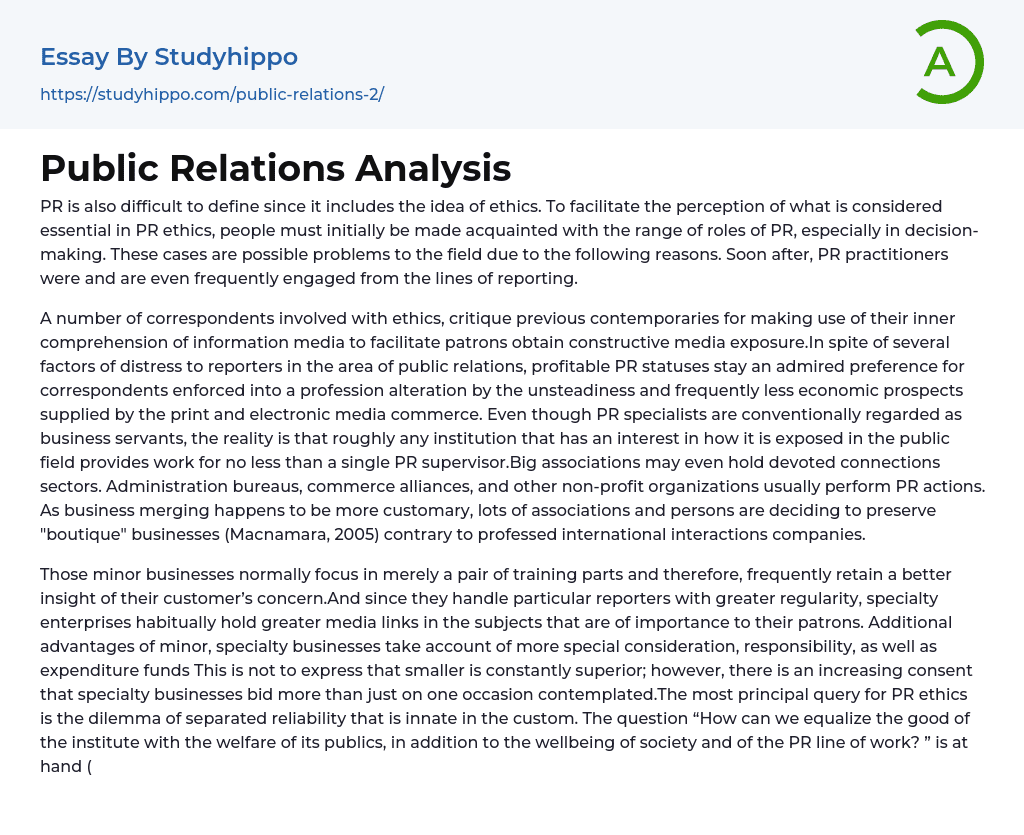It can be difficult to define PR because of its connection to ethics. To fully comprehend the importance of ethics in PR, it is crucial to grasp the varied functions of PR, especially in decision-making. This difficulty arises as PR professionals are frequently involved in reporting and may confront potential issues connected with their involvement in such roles.
Despite criticism of using personal media knowledge to help clients gain positive exposure, successful PR positions remain popular for journalists seeking more stable and profitable careers. While traditionally associated with corporations, almost any institution concerned with public perception employs at least one PR manager. This includes government agencies, industry associations, and non-profit organizations, many of which engage in their own PR activities or have dedicated communication departments. As business consolidations increase, some individuals and organizations are turning to smaller "boutiqu
...e" firms over larger international ones (Macnamara, 2005).
Specialty businesses, which usually focus on only a few training areas, are known to have a better understanding of their customers' concerns. These smaller businesses also often have stronger media connections in their clients' important subjects due to their frequent work with specific reporters. Smaller, specialty businesses offer additional benefits such as personalized attention, responsibility and cost savings. It should be noted that smaller does not necessarily mean superior. However, more and more people agree that specialty businesses offer more than previously thought. The biggest ethical concern in PR is balancing the interests of the company with those of its public, society and the PR industry itself. This issue surrounding separated reliability remains unsolved despite the fact that neither complete loyalty nor genuine sponsorship is the answer (Stoykov & Pacheva, 2005).
Enhancing ethica
values that promote balanced loyalty and fair exchange of ideas can be a more effective solution. It is important to note that PR professionals are bound to ethical obligations, beginning with the preservation of personal integrity, followed by fulfilling commitments to clients by utilizing their expertise in their best interest. Additionally, practitioners are obligated to uphold their organization's objectives and strategies. They must also adhere to professional and occupational standards, which reflect on the reputation of their peers. Lastly, PR practitioners should consider the needs and desires of society as a whole.
The main concern for individuals working in PR is to fulfill their duties without worrying about being monitored. According to Bernays, PR can be categorized as an "applied social science" that utilizes various fields of study, including psychology and sociology, to strategically manage the thoughts and actions of a vast and unorganized public (Tye, 1998, p.317).
The Public Relations Society of America (PRSA) established the "Professional Standards for the Practice of Public Relations" in 1950, preceding the current Code of Ethics which was last modified in 2000. Tymson and Lazar (2006) identified six key standards as "Sponsorship, Integrity, Proficiency, Sovereignty, Allegiance, and Equality." The six code provisions consulted with encompass "Open stream of knowledge, Competition, Disclosure of Information, Assurance, Divergence of concerns, and Improving the work." Modern public relations involves various techniques which incorporate these principles, including surveys and focus groups to evaluate public opinion. These are combined with advanced procedures such as internet communication, database-driven faxes, and other methods to promote a client's interests. The PRSA states that fields such as "communication arts, psychology, sociology, political science, economics, and the principles of management
and ethics" are necessary for certified practitioners. Scientific expertise is essential for tasks like outlook study, public affairs examination, media associations, organizational promotion, motion picture making, exclusive proceedings, and productions.
- Values of Life essays
- Ethical dilemma essays
- Normative Ethics essays
- Virtue Ethics essays
- Belief essays
- Deontology essays
- Moral essays
- Virtue essays
- Work Ethic essays
- Animals essays
- Charles Darwin essays
- Agriculture essays
- Archaeology essays
- Moon essays
- Space Exploration essays
- Sun essays
- Universe essays
- Birds essays
- Horse essays
- Bear essays
- Butterfly essays
- Cat essays
- Dolphin essays
- Monkey essays
- Tiger essays
- Whale essays
- Lion essays
- Elephant essays
- Mythology essays
- Time Travel essays
- Discovery essays
- Thomas Edison essays
- Linguistics essays
- Journal essays
- Chemistry essays
- Biology essays
- Physics essays
- Seismology essays
- Reaction Rate essays
- Roman Numerals essays
- Scientific Method essays
- Mineralogy essays
- Plate Tectonics essays
- Logic essays
- Genetics essays
- Albert einstein essays
- Stars essays
- Venus essays
- Mars essays
- Evolution essays




